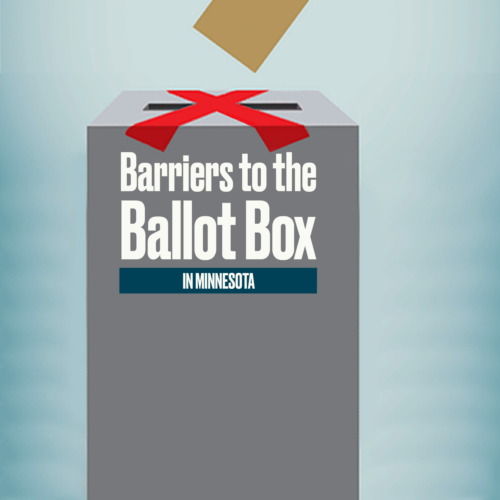Introduction
Tens of thousands of Minnesotans with felony convictions are prohibited from voting every year because they haven’t finished serving out the terms of their probation or parole.
For years, some lawmakers and voting rights advocates have been trying to restore their right to vote through the legislature and courts.
Sign up for The Moment newsletter
Our CEO Susan Smith Richardson guides you through conversations and context on race and inequality.
On most other fronts, Minnesota voters have broad access to the polls.
“We feel fairly lucky — knock on wood — that we have pretty good election laws in Minnesota,” said Jana Kooren, community engagement director for the American Civil Liberties Union of Minnesota. “There’s not a long list of things to get rid of.”
Photo ID is not required to cast a ballot, and voters can register to vote on the day of the election.
This year, through a lawsuit, advocates were able to do away with a cap on the number of people volunteers could assist at polling places with issues like translation or marking ballots.
Advocates filed a separate lawsuit in the wake of the COVID-19 pandemic, successfully arguing that all registered voters should be mailed absentee ballot applications and that the requirement for a witness signature on absentee ballots should be waived.
“Racial justice depends in part on voting access,” said David McKinney, staff attorney for the ACLU of Minnesota. “No Minnesotan should have to choose between the right to vote and their health.”
Here’s a look at one of the few remaining barriers to vote in Minnesota:
Felony disenfranchisement
Minnesota has one of the lowest rates of imprisonment in the country, but that means residents convicted of felonies often wind up on parole longer, Kooren said. The state still prohibits parolees from voting, which means 50,000 to 60,000 people can’t vote each year.
The ACLU of Minnesota has been fighting to allow anyone convicted of a felony — even if they’re still in prison — the right to vote.
“We don’t think voting rights is something that should be taken away from any citizen,” Kooren said.
The law disproportionately affects Black men in Minnesota; 10% to 12% of Black men there are disenfranchised from voting.
Read more in Money and Democracy
US Polling Places
Maine, an otherwise progressive voting rights state, won’t change absentee ballot deadline
Proponents worry voters won’t have a chance to fix mistakes ahead of Election Day.
US Polling Places
In Delaware, early voting will have to wait, and late ballots will be tossed
Advocates failed in their bid to count all absentee ballots postmarked by Election Day.


Join the conversation
Show Comments